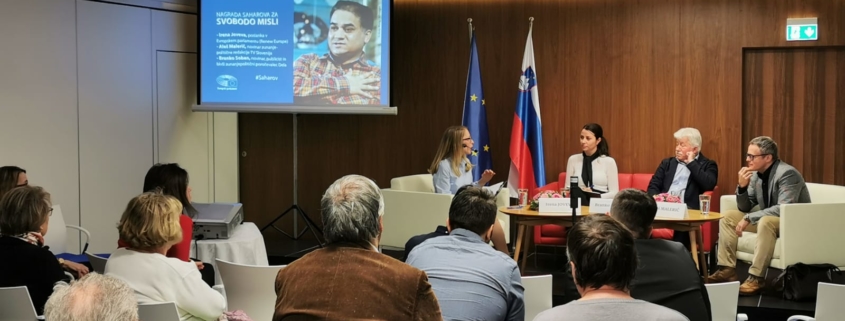The European Parliament awards the Sakharov Prize for Freedom of Thought to deserving individuals and organisations that make an outstanding contribution to the fight for human rights. This year the award was won by an Uyghur human rights activist and Uyghur minority rights activist in China, Ilham Tohti. On Friday, 10th of January 2020, the European Parliament’s Office in Slovenia prepared a round table on the importance of this award, this year’s winner and his fight. Following the screening of the documentary about the life and work of the activist Tohti, a round table took place with the keynote speakers being MEP Irena Joveva, the doyen of Slovenian journalism Branko Soban and a journalist of the Slovenian National Television Aleš Malerič.
China perceives any departure from the ideals of the Communist Party and the destruction of populations unity as a separatist act. The accusations of separatist activism sentenced Ilham Tohti to life in prison after a two-day mounted trial in September 2014. For more than two decades, Tohti has worked tirelessly for dialogue and understanding between the Uyghur and Han community. He has strongly advocated the implementation of regional autonomy legislation in China. Tohti created the “Uyghur Online” website where he regularly criticised the exclusion of the Uyghur population from China’s development and promoted awareness of the Uyghur community’s position as well as treatment of Chinese society. Despite Chinese reluctance, he received several awards for his work: the PEN / Barbara Goldsmith Award for Freedom of Writing (2014), the Martin Ennals Award (2016) and the International Liberal Freedom Award (2017). Furthermore, he was nominated for the Nobel Peace Prize in 2019.
“European Parliament has given a clear signal to China by selecting Tohti as the winner,” MEP Joveva emphasised at the round table. According to her, it is the so-called soft power that they have as MEPs. They sent a message making it clear that the human rights abuses of the Uyghur minority in China are unacceptable: “The sad and worrying fact is, there are so many Sakharov nominees today. Having such rewards is important because they raize awareness of the general public, which becomes more wary of serious human rights violations, as several remain un-exposed.”
Certain EU leverage could be used, said Joveva. For example, the 2019 Sakharov Prize, could be a stepping stone to the creation of an independent, international and unlimited EU mission. Similar to how the EU set up the identification of human rights violations mission in Myanmar in 2017. Keeping in mind that on the one hand, China is a very powerful geopolitical player; on the other hand, the EU has a problem of irregular performance. “We have heard and seen it many times, in many cases. Until we achieve a uniform foreign policy and a uniform approach by the EU Member States, individual countries will succumb to the pressure of Chinese capital,” Joveva added.
China is well aware of its economic strength and is taking advantage of its position in bilateral talks, especially when negotiating investment with the individual EU Member States. EU’s decisive demands for the respect of the human rights of all people in China in precluded by the fear of China’s economic retaliation and uneven behaviour of the EU Member States. EU action towards drastic sanctions, such as interruption of economic cooperation, is an entirely unrealistic expectation. However, according to Joveva, specific alternatives would be possible: rejecting senior officials’ visa applications, freezing property and not cooperating with business related to the operation of detention or even concentration camps for Uyghurs in Xinjiang province. Alternatively, a unanimous voice of diplomacy, profession and economy working together in demand for respect for human rights could make some progress, as in the 25-year’ three-track’ human rights negotiations with China we have yet to progress.




Leave a Reply
Want to join the discussion?Feel free to contribute!